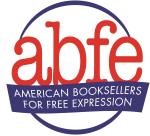- Categories:
ABFE Free Speech Report
- By David Grogan
 As the American Booksellers for Free Expression (ABFE) transitions into ABA’s growing Advocacy division, ABFE has remained extremely busy in its work on behalf of the rights of readers in the face of those who would censor books and speech. Given the current political and social climate, it seems unlikely that attacks on free speech will dissipate anytime soon.
As the American Booksellers for Free Expression (ABFE) transitions into ABA’s growing Advocacy division, ABFE has remained extremely busy in its work on behalf of the rights of readers in the face of those who would censor books and speech. Given the current political and social climate, it seems unlikely that attacks on free speech will dissipate anytime soon.
Over the past month, the ABFE has been busy working with free speech groups to oppose a number of attempts by schools or courts to censor books and to squelch free speech.
In late January, and then again this week, ABFE wrote the U.S. State Department, urging the department to continue to pressure the Chinese government to release the Chinese-born Swedish citizen and bookseller/publisher Gui Minhai. (See this week’s update on Gui.)
Also, under the banner of the Kids’ Right to Read Project, ABFE joined with the National Coalition Against Censorship, the National Council of Teachers of English, the Comic Book Legal Defense Fund, and the Author’s Guild in opposing schools’ attempts to ban certain books:
- In mid-January, a parent requested to have To Kill a Mockingbird removed from the high school curriculum of the Monona Grove School District (MGSD) in Monona Grove, Wisconsin, as reported by Madison365.com. The request was made by parent who cited 48 racial slurs in the book directed at African Americans.
In a letter to MGSD, the groups wrote to offer guidance to the district’s established book review committee as they considered the request to remove Harper Lee’s book, but also urged the school to “retain the book in the curriculum.” The groups stressed that “removing the book from the curriculum in response to parental pressures would raise serious First Amendment concerns.” They cited Board of Education vs. Pico, where the U.S. Supreme Court cautioned school officials against removing books “simply because they dislike the ideas contained in those books….”
- In late January, the principal at Ft. King Middle School in Ocala, Florida, removed The Facts Speak for Themselves by Brock Cole from the school library after parents complained that the book contains “pornographic language,” as reported by Spectrum News 13.
In a letter to Principal Smallridge, the groups stressed that the U.S. Supreme Court has established that public school officials’ discretion regarding the removal of library books is limited to ensure the protection of students’ First Amendment right to access information. “Brock Cole’s The Facts Speak for Themselves is certainly a story that is not out of place in a school library,” the letter noted. “Told from the perspective of its 13-year-old narrator, Linda, the novel tells the story of how she survives sexual abuse, parental neglect, and exposure to violence.”
- In early February, Lois Lowry’s classic The Giver was challenged by a parent in McKinney, Texas, over euthanasia and sexual content. The district has convened a committee to review the book this week. In their letter, the free speech groups urged the school to “make its decision on the basis of the literary and pedagogical merit of the book, rather than modify the curriculum to suit the beliefs of individual parents.”
In addition, in January, ABFE joined an amicus brief in the case of Gravano and Lohan vs. Take-Two Interactive Software. The case stems from a Grand Theft Auto V computer game, which features characters that are allegedly based on Lindsay Lohan and Mob Wives star Karen Gravano. Lohan and Gravano sued Take-Two Interactive Software, claiming that this violated what is generally called their “right of publicity” (or “right of privacy” in New York), as reported by Reason.com. The amicus that ABFE joined supports Take-Two’s argument that creators have long worked real famous people into their fictional stories, and they have a First Amendment right to do so.
On February 7, the New York Court of Appeals heard 50 minutes of oral arguments from lawyers representing both sides, as reported by Courthouse News. “The legal rule here that we are asking this court to continue enforcing, the rule that creative works simply are not trade or advertising, is a rule that has been bedrock in this state and recognized by creators all around this country,” Jeremy Feigelson, an attorney for Take-Two and Rockstar Games, stated during oral arguments.

